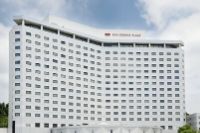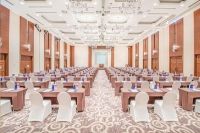Venue & Hospitality
Accommodations will be provided at
ANA Crowne Plaza Narita
68 Horinouchi
Narita
Tokyo, Japan
Conference Dates: December 07-08, 2020
Hotel Services & Amenities
- Audio/Visual Equipment Rental.
- Business Center.
- Business Phone Service.
- Complimentary Printing Service.
- Express Mail.
- Fax.
- Meeting Rooms.
- Office Rental.
- Photo Copying Service.
- Secretarial Service.
- Telex.
- Typewriter.
- Video Conference.
- Video Messaging.
- Video Phone.
- ATM.
- Baggage Storage.



Transportation
Driving Directions to
• Take shuttle from Narita International Airport.
• The journey normally takes around 15-20 minutes from the airport to the ANA Crown Plaza Narita.
• Free Airport Shuttle buses depart from Tokyo Narita International Airport to the hotel.
Route Map
About City
Tokyo, the capital city of the parliamentary democratic monarchy of Japan, is also home to the Emperor's Palace and the seat of Government and Parliament. In East-Central Honshu, the largest of Japan's main islands, this heavily populated city is well worth exploring. The cultural side of Tokyo is famous for its numerous museums; theaters; festivals; internationally noted cuisine; and professional sports clubs, including baseball, football (or soccer), along with traditional Japanese pursuits like Sumo Wrestling. It's also a city rich in music and theater, with numerous venues featuring everything from Japanese to modern dramas, symphony orchestras, and pop and rock concerts.
The chief attraction of Tokyo's Marunouchi district is the Imperial Palace with its beautiful 17th-century parks surrounded by walls and moats. Ginza is Tokyo's busiest shopping area and is as iconic as Times Square in New York, and much older: it's been the commercial center of the country for centuries, and is where five ancient roads connecting Japan's major cities all met. Dedicated to Kannon, the Buddhist goddess of compassion, SensÅ-ji Temple was established in AD 645 and retains its original appearance despite having been rebuilt numerous times. National Museum of Nature and Science (Kokuritsu Kagaku Hakubutsukan) opened in 1871 and is one of the country's oldest museums. The museum houses a vast collection of materials related to natural history and science, including many fascinating interactive displays on space development, nuclear energy, and transportation. Ueno Park is the city's largest green space and one of its most popular tourist attractions.
Tokyo, the capital city of the parliamentary democratic monarchy of Japan, is also home to the Emperor's Palace and the seat of Government and Parliament. In East-Central Honshu, the largest of Japan's main islands, this heavily populated city is well worth exploring. The cultural side of Tokyo is famous for its numerous museums; theaters; festivals; internationally noted cuisine; and professional sports clubs, including baseball, football (or soccer), along with traditional Japanese pursuits like Sumo Wrestling. It's also a city rich in music and theater, with numerous venues featuring everything from Japanese to modern dramas, symphony orchestras, and pop and rock concerts.
The chief attraction of Tokyo's Marunouchi district is the Imperial Palace with its beautiful 17th-century parks surrounded by walls and moats. Ginza is Tokyo's busiest shopping area and is as iconic as Times Square in New York, and much older: it's been the commercial center of the country for centuries, and is where five ancient roads connecting Japan's major cities all met. Dedicated to Kannon, the Buddhist goddess of compassion, SensÅ-ji Temple was established in AD 645 and retains its original appearance despite having been rebuilt numerous times. National Museum of Nature and Science (Kokuritsu Kagaku Hakubutsukan) opened in 1871 and is one of the country's oldest museums. The museum houses a vast collection of materials related to natural history and science, including many fascinating interactive displays on space development, nuclear energy, and transportation. Ueno Park is the city's largest green space and one of its most popular tourist attractions.
Tokyo, the capital city of the parliamentary democratic monarchy of Japan, is also home to the Emperor's Palace and the seat of Government and Parliament. In East-Central Honshu, the largest of Japan's main islands, this heavily populated city is well worth exploring. The cultural side of Tokyo is famous for its numerous museums; theaters; festivals; internationally noted cuisine; and professional sports clubs, including baseball, football (or soccer), along with traditional Japanese pursuits like Sumo Wrestling. It's also a city rich in music and theater, with numerous venues featuring everything from Japanese to modern dramas, symphony orchestras, and pop and rock concerts.
The chief attraction of Tokyo's Marunouchi district is the Imperial Palace with its beautiful 17th-century parks surrounded by walls and moats. Ginza is Tokyo's busiest shopping area and is as iconic as Times Square in New York, and much older: it's been the commercial center of the country for centuries, and is where five ancient roads connecting Japan's major cities all met. Dedicated to Kannon, the Buddhist goddess of compassion, SensÅ-ji Temple was established in AD 645 and retains its original appearance despite having been rebuilt numerous times. National Museum of Nature and Science (Kokuritsu Kagaku Hakubutsukan) opened in 1871 and is one of the country's oldest museums. The museum houses a vast collection of materials related to natural history and science, including many fascinating interactive displays on space development, nuclear energy, and transportation. Ueno Park is the city's largest green space and one of its most popular tourist attractions.
Tokyo, the capital city of the parliamentary democratic monarchy of Japan, is also home to the Emperor's Palace and the seat of Government and Parliament. In East-Central Honshu, the largest of Japan's main islands, this heavily populated city is well worth exploring. The cultural side of Tokyo is famous for its numerous museums; theaters; festivals; internationally noted cuisine; and professional sports clubs, including baseball, football (or soccer), along with traditional Japanese pursuits like Sumo Wrestling. It's also a city rich in music and theater, with numerous venues featuring everything from Japanese to modern dramas, symphony orchestras, and pop and rock concerts.
The chief attraction of Tokyo's Marunouchi district is the Imperial Palace with its beautiful 17th-century parks surrounded by walls and moats. Ginza is Tokyo's busiest shopping area and is as iconic as Times Square in New York, and much older: it's been the commercial center of the country for centuries, and is where five ancient roads connecting Japan's major cities all met. Dedicated to Kannon, the Buddhist goddess of compassion, SensÅ-ji Temple was established in AD 645 and retains its original appearance despite having been rebuilt numerous times. National Museum of Nature and Science (Kokuritsu Kagaku Hakubutsukan) opened in 1871 and is one of the country's oldest museums. The museum houses a vast collection of materials related to natural history and science, including many fascinating interactive displays on space development, nuclear energy, and transportation. Ueno Park is the city's largest green space and one of its most popular tourist attractions.
